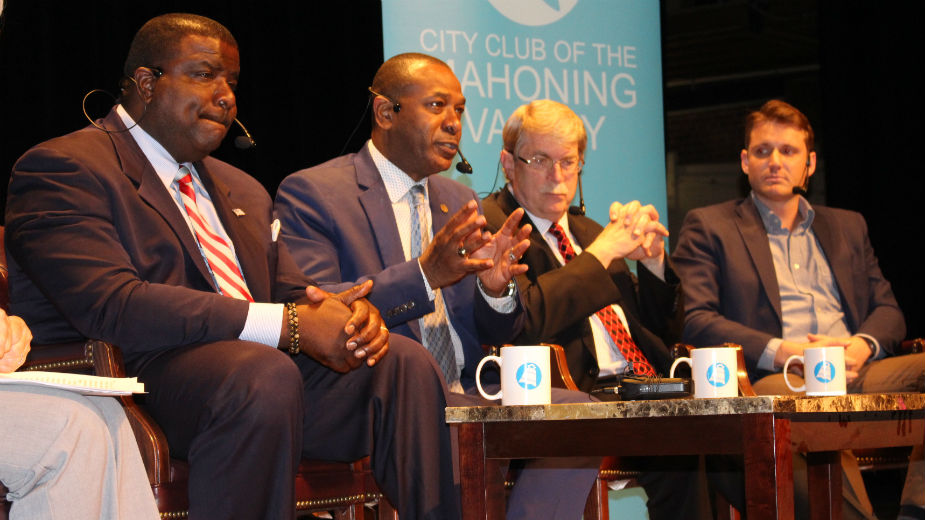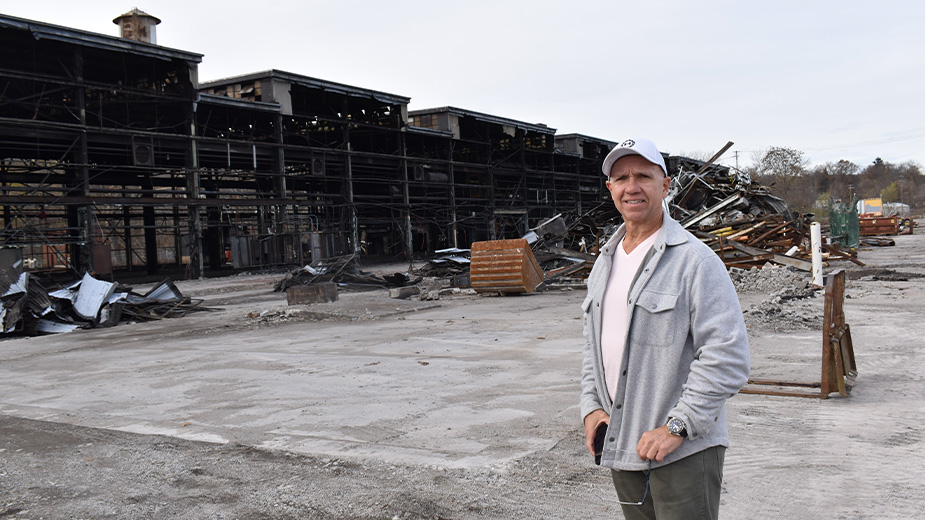First ‘State of the Valley’ Tackles Big Issues
WARREN, Ohio — Preparing a workforce for the jobs of tomorrow, addressing the concerns of low-wage earners, continuing a cooperative regional approach to new development, and adapting local government to address the needs of young people.
These were just some of the issues the mayors of Youngstown and Warren and two economic development specialists tackled Monday evening during the inaugural “State of the Valley” forum, presented by the City Club of the Mahoning Valley.
“We’re doing our best to attract jobs using a team approach,” said Doug Franklin, mayor of Warren. “We’re looking beyond our borders seeking partnerships.”
Youngstown Mayor Jamael Tito Brown, Warren Community Development Director Michael Keys, and Economic Development Liaison for the City of Youngstown Dominic C. Marchionda Jr. joined Franklin for the event, held at W.D. Packard Music Hall and attended by about 200 guests.
M.L. Schultze, news team reporter and digital editor at WKSU, served as moderator for the discussion.
A critical component to achieving sustained economic development, the panelists agreed, is to maintain a unified effort to market the assets of the entire Mahoning Valley, instead of resorting to the isolated, parochial environment that divided the communities in the past.
“We want people to see that we’re a unified front,” Brown said. “We see the Mahoning Valley as a family,” he noted, while acknowledging that there is still a degree of competitiveness within the region.
As an example, Franklin pointed to the efforts of Valley representatives who flew to Washington D.C. last week to lobby for two important projects. One of those projects — a prospective missile defense system at the Ravenna Arsenal, most of which is located in Portage County — would be an economic shot in the arm that could lead to the creation of “thousands of jobs,” he said.
“It’s located in Portage County, but it’s a catalyst for the entire area,” Brown echoed.
The site is among three finalists for the defense system, he said.
A second effort was to petition Washington officials and the Trump Administration for help in cleaning the Mahoning River, an asset that all communities across the Mahoning Valley share, Brown noted.
Aside from the hope of big-ticket projects such as these, there stands the stark reality of a region that is still bleeding population as a result of the industrial upheaval that occurred more than 40 years ago.
These challenges have only made people in the Mahoning Valley more resilient, Marchionda said. “We know the hand we’ve been dealt,” he said. However, the fact that there are two mayors sharing a stage talking about common economic development goals sends a strong message that these communities have an eye on regional success.
Developments in both downtown Youngstown and Warren have helped lure young people back to the central business district over the last 10 years or so, Marchionda said. Moreover, it’s this quality of life and potential for new opportunity that have convinced other young people to return and play an active role in redeveloping their communities.
“It’s completely invigorating to hear that they’ve come back,” he said.
Marchionda, 31, represents a generation that didn’t witness firsthand the collapse of the region’s steel industry. Moreover, those economic development models that might have worked a half century ago have little relevance to the modern economy and the careers younger people are pursuing.
Brown acknowledged understanding that and listening to younger people is an important way to adapt local government to the changing nature of the region. “I have a neighbor who sells clothes online,” he noted. “He’s worried about his website and his brand – there’s a completely different concept of work,” he said. “We need to connect with them.”
Franklin said that training for the jobs of tomorrow requires a completely different approach to developing these skill sets than it did 30 years ago. “You have to prepare the workforce differently,” he said, citing initiatives in biomedical technology in the Cleveland area, which created an ecosystem that incorporated research, manufacturing and training.
Addressing the needs of young entrepreneurs and small businesses is equally as important, Brown noted. “We have to be economic-ready with not just land, but also workers.”
Meanwhile, the cities have supported youth programs that are designed to build new skills and provide adequate employment for young people, Keys said.
“We’ve helped fund and support YouthBuild programs and their education efforts,” he said.
Franklin added that it’s critical that the private sector partners with the city in initiatives such as the Summer Career Development Program — a program devoted to preparing young people for the working world.
“It’s a partnership between the business community, the city of Warren, the Raymond J. Wean Foundation and Warren City Schools,” he said. This is the first year for the program, he noted, but believes it has a strong future.
Brown said forums such as these are important to elevate the dialogue not only between public officials, but also the residents and those from outside the area. “The more that individuals outside of the Valley see that we’re working together speaks volumes,” he said.
Franklin also thought the panel helped facilitate a conversation over topics that point to continued cooperation and interaction between public officials across the Valley. “It gives me tremendous excitement about the future. Events like this really energize myself as a mayor – things like this are important to laying the groundwork for discussions about shaping our own future.”
Pictured above: Jamael Tito Brown, Mayor of Youngstown, William D. Franklin (Doug Franklin), Mayor of Warren, Michael D. Keys, Community Development Director, City of Warren, and Dominic C. Marchionda, Jr., Economic Development Liaison, City of Youngstown.
Copyright 2024 The Business Journal, Youngstown, Ohio.



